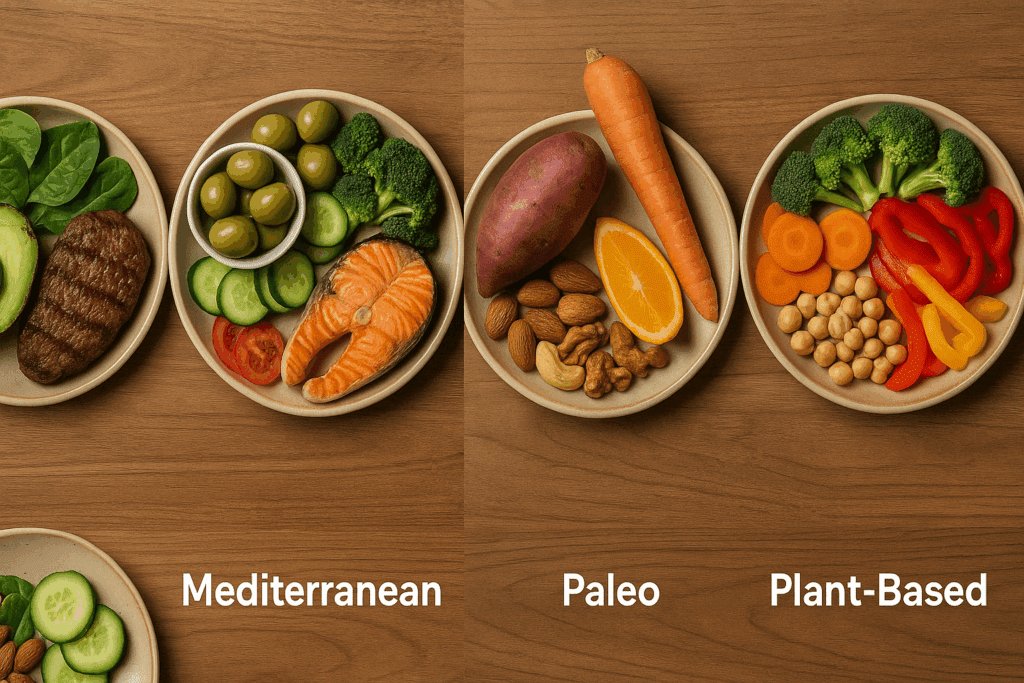In a world inundated with nutritional advice, the pursuit of the “perfect diet” often leads consumers down a labyrinth of conflicting information. From celebrity endorsements to viral TikTok trends, diet names have become household terms, each promising dramatic health benefits and rapid results. However, the real challenge lies not in choosing a diet, but in discerning which among the vast list of diet options aligns with evidence-based health principles—especially those rooted in plant-based nutrition. For individuals seeking both wellness and longevity, understanding the strengths and shortcomings of the most common diets through the lens of clinical expertise can illuminate a more sustainable path to health.
You may also like: Plant Based Diet vs Standard American Diet: What the Latest Studies Reveal About Long-Term Health Outcomes
This guide explores the top entries on the diet name list with the scrutiny of scientific rigor, clinical insight, and practical relevance. We will examine what makes certain eating patterns stand out, debunk common myths, and underscore how plant-based approaches compare to mainstream dietary trends. Whether you’re curious about keto or exploring the Mediterranean lifestyle, this comprehensive analysis connects the dots between popular dietary strategies and the powerful benefits of whole-food, plant-based nutrition.
Understanding the Purpose Behind Diet Names
Every diet name is more than just a label—it represents a philosophy, a community, and often a commercial interest. From the Paleo Diet to Intermittent Fasting, the proliferation of diet names over the past few decades has reflected evolving understandings of nutrition, health, and metabolic function. But with this growth in dietary branding comes the risk of oversimplification. Many individuals adopt diets based on surface-level promises or anecdotal results, often overlooking critical factors such as long-term sustainability, nutrient adequacy, and individual health status.
The expanding list of diet plans reflects our collective desire to manage weight, reduce disease risk, and improve quality of life. However, the mere popularity of a diet does not equate to its efficacy or safety. Some common diets may initially show positive outcomes, but lack of proper nutrient balance, reliance on processed foods, or extreme restrictions can lead to unintended consequences. Thus, it’s imperative to explore each diet with an eye toward its foundational science and real-world implications.
In analyzing the most frequently discussed diet name list, it becomes evident that many diets fall short in areas such as cardiovascular health, gut microbiome support, and anti-inflammatory capacity—areas where plant-based diets excel. To distinguish substance from hype, we need to evaluate these programs not just by their buzzwords, but by the degree to which they align with evidence-based nutritional practices.

Decoding the Most Common Diets
Among the most common diets are the ketogenic diet, the Mediterranean diet, the Paleo diet, the DASH diet, and plant-based variants such as vegetarianism and veganism. Each of these eating patterns carries unique characteristics, potential health outcomes, and philosophical underpinnings. While the ketogenic diet prioritizes extreme carbohydrate restriction to induce a metabolic state called ketosis, the Mediterranean diet emphasizes whole grains, fruits, vegetables, olive oil, and moderate fish intake. The Paleo diet draws inspiration from presumed pre-agricultural eating habits, promoting animal proteins, nuts, and vegetables while avoiding grains and dairy.
Despite their popularity, these diets differ significantly in how they impact long-term health. A recurring theme among the most respected entries on the diet name list is the inclusion of plant foods as central components. Even the Mediterranean diet—widely praised for its cardiovascular benefits—draws its strength from high consumption of plant-based staples like legumes, leafy greens, and fruits. In contrast, more restrictive approaches like the carnivore diet, which eliminates plant foods entirely, lack substantial scientific support and may pose risks when followed over time.
The list of diet options continues to expand with variations such as Whole30, Atkins, South Beach, and newer trends like the Sirtfood diet. Yet, many of these programs share common pitfalls: short-term focus, reliance on restriction, and limited scientific validation. A common thread among the most effective and sustainable approaches is a foundation in whole, unprocessed plant foods—a hallmark of plant-based nutrition.
Plant-Based Diets as the Evidence-Based Standard
When evaluating diets from a clinical perspective, one constant emerges: plant-based diets are consistently linked to improved health outcomes across a range of conditions. Numerous studies have demonstrated that eating patterns centered around whole plant foods are associated with lower risks of heart disease, type 2 diabetes, certain cancers, and overall mortality. Unlike many common diets that rely heavily on animal protein or processed meal replacements, plant-based diets prioritize nutrient density, fiber, and bioactive compounds with anti-inflammatory and antioxidant properties.
The list of diet programs that produce long-term results while minimizing risk tends to favor those rich in plant-based components. Diets that fall under the whole-food, plant-based umbrella are distinguished by their emphasis on foods as close to their natural state as possible. This approach reduces exposure to added sugars, unhealthy fats, and synthetic additives, all while enhancing intake of vitamins, minerals, and phytochemicals.
A common misperception is that plant-based diets are restrictive or lacking in variety. In reality, they offer diverse culinary possibilities and can be tailored to individual preferences and cultural traditions. From lentil stews to tofu stir-fries, plant-based meals are not only nourishing but also deeply satisfying. When compared to other entries in the diet name list, plant-based diets consistently demonstrate superior health metrics without compromising flavor or enjoyment.

Clinical Comparisons: Plant-Based Versus Other Common Diets
To understand the superiority of plant-based diets, it helps to contrast them with other prevalent entries on the list of diet options. The ketogenic diet, for instance, may yield rapid weight loss and short-term blood sugar improvements, but it often leads to increased intake of saturated fats and a reduction in fiber—both of which have implications for long-term cardiovascular and gut health. Similarly, while the Paleo diet eliminates processed foods, it also excludes beneficial food groups such as legumes and whole grains, limiting its nutritional completeness.
The DASH (Dietary Approaches to Stop Hypertension) diet and the Mediterranean diet stand out among common diets for their focus on whole foods and plant inclusion. However, both still incorporate moderate amounts of animal products, which may not be ideal for individuals seeking maximal anti-inflammatory benefits or those managing chronic conditions like kidney disease or high cholesterol. In contrast, whole-food, plant-based diets eliminate dietary cholesterol entirely and reduce saturated fat intake to near zero, offering an unparalleled profile for heart health.
One must also consider adherence and sustainability. While many people struggle to maintain restrictive regimens like intermittent fasting or Atkins, plant-based diets often become long-term lifestyle choices due to their flexibility and inclusivity. The ability to enjoy a wide array of colorful fruits, vegetables, grains, legumes, and spices makes plant-based living both practical and pleasurable. As more entries are added to the ever-growing list of diet trends, plant-based nutrition continues to be the gold standard against which others are measured.
The Cultural and Ethical Dimensions of Diet Names
Beyond the biological effects of food, the diet names we embrace often reflect deeper societal values. Choosing a plant-based lifestyle may stem from ethical concerns about animal welfare, environmental sustainability, or food justice. These motivations, while sometimes overlooked in medical discourse, contribute meaningfully to overall well-being and life satisfaction. Diet is not merely a biochemical transaction; it is a daily practice that intersects with identity, community, and purpose.
Many common diets in the Western world emphasize individual transformation through discipline and deprivation. In contrast, plant-based nutrition often fosters a sense of connection—to nature, to cultural heritage, and to a broader vision of planetary health. This is particularly relevant as the global climate crisis draws attention to the environmental costs of industrial meat production. Shifting toward diets lower on the food chain not only benefits personal health but also reduces greenhouse gas emissions, land degradation, and water pollution.
The language we use when discussing diet names matters. Naming a diet creates a framework for understanding, but it can also create barriers. Labels like “vegan” or “low-carb” can evoke strong emotional responses, influencing social dynamics and self-perception. A more nuanced approach may involve emphasizing principles over rigid labels, encouraging flexible adherence to evidence-based practices grounded in plant-focused nutrition.

Nutrition Science and the Evolution of Diet Trends
Nutrition is a dynamic science, shaped by emerging research, evolving technology, and shifting cultural paradigms. As such, the diet name list is not static. New entries emerge, old ones are rebranded, and public perception fluctuates in response to headlines and health influencers. This fluidity underscores the importance of grounding dietary choices in robust, peer-reviewed evidence rather than marketing claims or transient popularity.
While some diets achieve fleeting fame due to celebrity promotion or social media buzz, their scientific credibility may be lacking. It is crucial to distinguish between anecdotal success and statistically significant outcomes derived from randomized controlled trials or large epidemiological studies. Within the extensive list of diet strategies, those with a plant-based foundation consistently demonstrate favorable outcomes in terms of weight management, metabolic function, and disease prevention.
Importantly, nutrition recommendations should evolve based on new discoveries, but the core principles of healthful eating have remained remarkably consistent over time. Diets rich in whole grains, leafy greens, nuts, legumes, and fruits have been associated with health and longevity across cultures and generations. These are the foundational elements of plant-based diets, making them not only a contemporary health strategy but also a timeless one.

What the Diet Name List Reveals About Public Health
Analyzing the most frequently cited entries on the diet name list offers valuable insight into public health trends and consumer priorities. Diets that promise rapid weight loss or detoxification often reflect societal pressures related to body image and instant gratification. Unfortunately, these priorities can overshadow long-term health goals and lead to cycles of yo-yo dieting, metabolic damage, and psychological distress.
In contrast, the growing interest in plant-based nutrition signals a shift toward more holistic and sustainable health models. Consumers are increasingly recognizing that true wellness extends beyond calorie counts and macronutrient ratios. Factors such as gut health, hormonal balance, immune function, and mental clarity are now part of the conversation, and plant-based diets are uniquely equipped to support these areas through their high levels of fiber, polyphenols, and essential micronutrients.
Public health organizations around the world, including the American Heart Association and the World Health Organization, now advocate for dietary patterns that emphasize plant foods. This alignment between institutional guidance and the core principles of whole-food, plant-based eating further reinforces its credibility. As healthcare providers seek to reverse the tide of chronic disease, the list of diet approaches worth recommending continues to narrow around those that deliver consistent, evidence-based outcomes.
Frequently Asked Questions: A Doctor’s Guide to the Most Common Diets
1. Why do new diet names keep appearing every year, and how should I evaluate them?
New diet names emerge frequently due to evolving consumer interests, advancements in nutrition science, and the influence of social media trends. Unfortunately, many of these diets are more marketing strategies than medically supported approaches. To evaluate them effectively, consider whether the diet promotes whole, minimally processed foods and supports long-term nutritional adequacy. Cross-reference new entries on the diet name list with peer-reviewed studies, and be wary of plans that rely on proprietary supplements or drastic restrictions. Diets that endure across generations, rather than those cycling through popularity, tend to have deeper roots in both tradition and evidence-based health outcomes.
2. Are there psychological risks associated with constantly switching between common diets?
Yes, frequent transitions between common diets can increase the risk of disordered eating patterns, body dissatisfaction, and food-related anxiety. Diet-hopping may also result in metabolic dysregulation, especially when caloric intake fluctuates significantly. The pressure to follow the latest diet name list can foster a sense of failure if results are not immediate or sustainable. Instead, a consistent, evidence-informed approach—such as one centered on plant-based nutrition—offers more psychological stability and improved long-term adherence. Building a sustainable relationship with food should be prioritized over short-term fixes or social validation from trying trendy diet names.
3. How does cultural background affect how we interpret and adopt items from a list of diet options?
Cultural identity plays a significant role in how individuals perceive and respond to different entries on a list of diet plans. Certain common diets may align better with traditional food practices, making them more accessible and sustainable for some communities. For instance, many Asian, Mediterranean, and African cuisines naturally emphasize plant-based ingredients, which may make the adoption of whole-food, plant-based eating more seamless. Conversely, adopting diet names rooted in unfamiliar or Western-centric frameworks can create a sense of disconnection or even nutritional imbalance if local ingredients are excluded. Customizing dietary strategies to respect cultural values enhances both adherence and nutritional diversity.
4. Can social dynamics influence which diet names gain popularity in specific regions or groups?
Absolutely. Social media platforms, influencer endorsements, and celebrity affiliations play a significant role in which diet names gain traction in certain demographics. What starts as a niche movement can rapidly evolve into a globally recognized diet name list due to viral marketing, even if the scientific basis is weak. Additionally, peer influence and group norms can pressure individuals into trying common diets without fully understanding the implications. When evaluating a trending diet name, it is critical to look beyond its popularity and assess whether it aligns with long-term health goals and scientific principles.
5. Why do some common diets seem to work well for a few people but not for others?
Individual responses to various common diets often vary based on genetics, microbiome composition, underlying health conditions, and lifestyle factors such as stress and sleep. For example, a high-protein diet may benefit someone with insulin resistance but could raise cholesterol in someone predisposed to cardiovascular disease. Entries on any list of diet strategies must be viewed through a personalized lens rather than a one-size-fits-all model. Moreover, the success of a diet often depends more on consistency and behavioral patterns than on the diet name itself. Seeking professional guidance can help determine which dietary framework aligns with your physiological and lifestyle needs.
6. How can someone critically assess the legitimacy of a new entry on a diet name list?
To evaluate whether a new addition to the diet name list is legitimate, begin by reviewing clinical studies published in reputable journals. Consider whether the plan has been endorsed by major health organizations or supported by long-term population studies. A credible diet should promote balanced macronutrients, adequate fiber, and diverse plant-based food groups. Watch out for overly simplistic messaging or miracle claims—hallmarks of fad diets rather than medically sound strategies. Comparing new diet names against well-established nutritional frameworks, such as the Mediterranean or whole-food, plant-based diets, can offer a valuable reality check.
7. Are plant-based versions of common diets, such as vegan keto or plant-based paleo, nutritionally sound?
Plant-based versions of popular common diets can be nutritionally sound if carefully planned to avoid deficiencies. A vegan keto approach, for example, must incorporate high-fat whole foods like avocado, nuts, and seeds while maintaining adequate protein through lentils, tofu, and tempeh. Plant-based paleo diets need to address the exclusion of grains and legumes by maximizing diversity among vegetables and fruits. Although such hybrid entries on the list of diet modifications require more attention to nutrient variety, they can align with both personal ethics and metabolic goals. Consulting a dietitian ensures that these adaptations remain balanced and sustainable.
8. How do marketing and the supplement industry shape the list of diet trends we see online?
The supplement industry often drives the popularity of certain diet names by creating a demand for products that allegedly enhance the diet’s effectiveness. This marketing push contributes to a growing list of diet plans that rely heavily on powders, pills, or proprietary formulas. While supplements can serve specific roles, such as correcting deficiencies or supporting limited diets, they should never be the foundation of a nutrition strategy. Consumers should critically examine whether a diet is genuinely health-focused or merely a vehicle for product sales. Transparent labeling, independent reviews, and evidence-based claims are essential in distinguishing hype from health.
9. What role does food accessibility play in choosing from a list of diet options?
Food accessibility significantly affects whether a person can realistically follow a given diet name. For example, low-income or rural communities may find it difficult to adhere to common diets that require expensive superfoods, imported ingredients, or organic-only items. This creates a disparity where only certain demographics can follow what’s trending on the latest diet name list. Plant-based diets, when based on staples like beans, rice, and seasonal vegetables, tend to be more affordable and inclusive. A responsible dietary recommendation must account not only for scientific validity but also for economic and geographical feasibility.
10. How might the future evolution of the diet name list be influenced by environmental concerns?
As environmental awareness grows, more consumers are factoring sustainability into their food choices, reshaping the diet name list in real time. Diets with lower ecological footprints—particularly plant-forward ones—are gaining traction among both individuals and institutions. Future entries on the list of diet models are likely to emphasize not only health but also environmental metrics such as carbon emissions, water usage, and biodiversity impact. The growing popularity of the “climatarian” and “planetary health” diets reflect this intersection of nutrition and environmental ethics. The next frontier in dietary evolution may well prioritize eco-nutrition alongside personal wellness, offering a more integrated approach to health and sustainability.

Reclaiming Health Through Evidence-Based Plant-Based Nutrition
For patients navigating the saturated landscape of diet names and trends, clarity comes through education and empowerment. By understanding the scientific foundations of various common diets, individuals can make informed decisions that align with their health goals, values, and lifestyles. Among the extensive list of diet options, whole-food, plant-based nutrition remains the most comprehensive, sustainable, and clinically supported choice.
What sets plant-based eating apart is not just its track record in managing and reversing chronic illness, but its capacity to nourish on multiple levels: physically, emotionally, and ethically. While many diet names are built on exclusion, restriction, or commodification, plant-based nutrition is built on abundance, diversity, and integration. It is a model of eating that meets the needs of modern health while honoring timeless principles of wellness.
As the conversation around nutrition continues to evolve, it becomes increasingly important to focus not only on what is popular, but on what is proven. The next time you encounter a new diet trend or hear about the latest addition to the diet name list, remember to ask: does this support long-term health? Does it prioritize whole, unprocessed foods? And most importantly, does it align with the growing body of evidence pointing toward the healing power of plants?
In the end, navigating the list of diet options isn’t about choosing a label. It’s about choosing a lifestyle that fosters vitality, resilience, and balance. And in that journey, plant-based nutrition stands as both compass and destination—a way of eating that is as nourishing as it is wise.
Was this article helpful? Don’t let it stop with you. Share it right now with someone who needs to see it—whether it’s a friend, a colleague, or your whole network. And if staying ahead on this topic matters to you, subscribe to this publication for the most up-to-date information. You’ll get the latest insights delivered straight to you—no searching, no missing out.
Further Reading:
Plant-Based Diets: A Physician’s Guide
What is a plant-based diet and why should you try it?
Beginner’s Guide to A Whole-Foods, Plant-Based Diet
Disclaimer
The information contained in this article is provided for general informational purposes only and is not intended to serve as medical, legal, or professional advice. While NewsHealthWatch strives to present accurate, up-to-date, and reliable content, no warranty or guarantee, expressed or implied, is made regarding the completeness, accuracy, or adequacy of the information provided. Readers are strongly advised to seek the guidance of a qualified healthcare provider or other relevant professionals before acting on any information contained in this article. NewsHealthWatch, its authors, editors, and contributors expressly disclaim any liability for any damages, losses, or consequences arising directly or indirectly from the use, interpretation, or reliance on any information presented herein. The views and opinions expressed in this article are those of the author(s) and do not necessarily reflect the official policies or positions of NewsHealthWatch.

